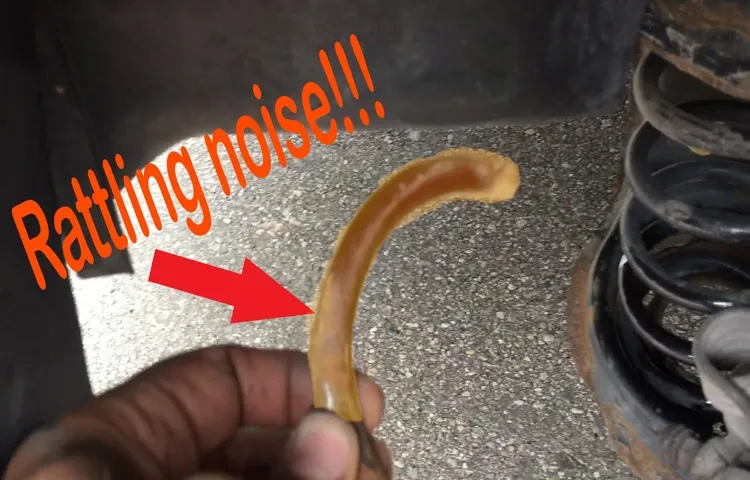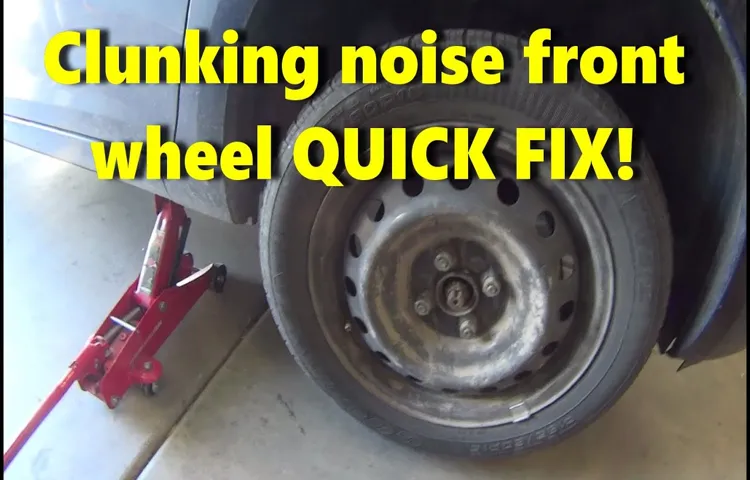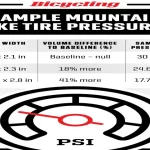Do you ever hear a rattling noise coming from your car’s tires? It can be a scary experience, especially if you don’t know what’s causing the sound. But don’t worry, you’re not alone. Many drivers have experienced this issue at one time or another, and it’s essential to understand the root cause of the problem.
The noise can range from a slight rattle to a loud clanging noise, and it’s crucial to address the issue before it affects the safety and performance of your vehicle. In this blog post, we’ll explore the different causes of tire rattling noise and how you can prevent it from happening in the future. So, let’s dive in and get to the bottom of this noisy issue!
Table of Contents
Possible Reasons for Rattling Noise
If you’re wondering why your tire is making a rattling noise, there could be a few possible reasons. One of the most common causes is that the lug nuts are loose or not tightened properly. This can cause the wheel to wobble and create the rattling sound.
Another reason could be a faulty suspension system, as worn-out parts can cause the tire to go out of alignment and create vibrations. Additionally, if there are any rocks or debris stuck in the tire treads, they can cause the tire to make a rattling noise as well. It’s important to inspect your tires regularly and take note of any unusual sounds or sensations while driving.
If you suspect there’s an issue with your tires, it’s always best to have a professional mechanic inspect them to ensure your safety on the road.
Worn-out Wheel Bearings
A common reason for a rattling noise in a car could be worn-out wheel bearings, which are responsible for allowing the wheels to spin smoothly and efficiently. Over time, constant use and exposure to the elements can cause the bearings to wear down, resulting in a rumbling or vibrating noise coming from the wheels. This noise is usually more noticeable when driving at higher speeds and can become increasingly intense as the bearings continue to deteriorate.
It’s important to address this issue as soon as possible, as damaged wheel bearings can lead to more serious and expensive problems, such as wheel failure or damage to other parts of the car. If you suspect that a rattling noise in your car may be the result of worn-out wheel bearings, it’s recommended to take the vehicle to a trusted mechanic for a thorough inspection and any necessary repairs.

Loose Lug Nuts
Are you experiencing a rattling noise in your vehicle? Loose lug nuts could be the culprit. Lug nuts are the fasteners that attach the wheel to the axle and when they are not properly tightened, they can cause the wheel to wobble and produce a rattling noise. This noise can be heard at low speeds and tends to get louder as the speed increases.
Loose lug nuts can also pose a serious safety hazard, as a wheel that detaches from the vehicle can cause a serious accident. There are several possible reasons why lug nuts might come loose. Over time, the constant vibration of the vehicle can cause the nuts to work themselves loose.
Another reason could be improper installation of the lug nuts during a tire change or maintenance. A torque wrench should always be used to tighten the lug nuts to the correct specifications. It’s important to have loose lug nuts addressed as soon as possible to avoid any potential hazards.
A mechanic can check to make sure that the nuts are tightened to the manufacturer’s specifications and can also inspect the wheels to ensure that they are not damaged. Regular maintenance of your vehicle’s wheels and lug nuts can help prevent this issue in the future. Remember, taking care of your vehicle is taking care of yourself.
Suspension Issues
If you’ve noticed a rattling noise coming from your vehicle’s suspension, several possible reasons could be at play. One of the most common culprits is worn-out or damaged suspension components, such as the shocks or struts. Another possible reason is loose bolts or joints in the suspension system, which can cause parts to vibrate and make noise.
Other potential causes include worn-out ball joints, faulty stabilizer bars, or damaged control arm bushings. When it comes to suspension issues, it’s important to get them checked out by a professional as soon as possible to prevent further damage to your vehicle and ensure your safety on the road. Don’t hesitate to schedule an appointment with your trusted mechanic to get to the bottom of the rattling noise and keep your car running smoothly.
Brake Problems
If you’ve noticed a rattling noise when applying your brakes, it’s essential to address this issue as soon as possible. Several problematic reasons could cause brakes to make rattling noises. One common reason is worn-out brake pads that are clattering against the rotor.
This causes vibrations that result in the noise you hear. Another possible cause is a loose brake caliper, struts, or suspension components. During braking, these worn-out parts can make a rattling noise, and if left unchecked, they can become dangerous.
Additionally, rusted or corroded brake components can cause rattling noises, indicating that they require replacement. Ultimately, the noise you hear while braking requires a professional diagnosis, so it’s best to have it checked by a certified mechanic. A quick fix now could prevent more expensive repairs or a potential brake failure in the future.
How to Diagnose Rattling Noise in Tires?
If you hear a rattling noise from your tire while driving, it could indicate a few different issues. Firstly, check to make sure there isn’t anything stuck in the tread of your tire, like a rock or nail. If there isn’t anything visibly lodged in the tread, it could be due to the tires being unbalanced or misaligned.
This can cause uneven wear on the tire, resulting in a rattling sound. It’s important to get your tires balanced and aligned regularly to ensure proper tire wear and handling. Additionally, worn-out suspension or steering components could also be the culprit.
If this is the case, it’s best to have a mechanic inspect your vehicle to diagnose and fix the issue. Ignoring rattling noises in your tires can lead to unsafe driving conditions and potential tire failure. Therefore, it’s important to address any issues as soon as you notice them.
Remember, maintaining your tire’s health is crucial for a smooth and safe driving experience on the road.
Listen for the Sound
When it comes to maintaining your vehicle, one of the most annoying things that can happen is hearing a rattling noise coming from your tires. Not only can it be distracting while driving, but it can also indicate a potential issue with your vehicle’s safety. To diagnose the rattling noise in your tires, first, listen closely to the sound.
Is it coming from one tire or multiple? Does it occur only when driving, or also when braking or turning? Once you have a better idea of the source of the noise, inspect the tire and surrounding components for any signs of damage or wear. This may include checking the lug nuts, suspension system, and wheel bearings. If you’re still having trouble pinpointing the origin of the rattling noise, it’s always best to take your vehicle to a trusted mechanic for a full inspection.
By catching any issues early on, you can prevent further damage and ensure your safety on the road.
Check the Wheel Bearings
If you hear a rattling noise in your tires, it’s important to diagnose the issue before it becomes a safety hazard. One of the potential culprits could be the wheel bearings. These are responsible for allowing the wheels to spin smoothly and if they become worn out or damaged, they can create a rattling or grinding noise.
To diagnose if the wheel bearings are causing the noise, there are a few steps you can take. First, drive straight and listen to see if the noise increases or decreases when turning left or right. If the noise changes, it could be a sign of a wheel bearing issue.
Additionally, you can lift your car and spin each wheel individually to see if any of them are making a noise. If you suspect that it’s a wheel bearing issue, it’s important to get it repaired as soon as possible to prevent further damage. By addressing the issue promptly, you can ensure that your vehicle remains safe for you and others on the road.
Tighten the Lug Nuts
Are you hearing an annoying rattling sound coming from your tires? It may be easy to dismiss it as just road noise, but it could actually be a sign of a more serious problem with your car. One of the most common causes of rattling tires is loose lug nuts. When your lug nuts are not tightened enough, it can cause the wheel to shake and vibrate, creating a rattling noise.
This is especially true if you have recently had new tires installed or had work done on your car. To diagnose the issue, start by checking the lug nuts on all four tires. Use a lug wrench to tighten them to the correct torque specification as provided by your car’s manufacturer.
If they were indeed loose, the rattling should stop. If the problem persists, it may be wise to take your car to a trusted mechanic who can further investigate the issue. Remember, ignoring a rattling noise in your tires can lead to more serious problems and potentially dangerous driving conditions.
So, if you suspect something is wrong, take action and address the issue as soon as possible.
Inspect the Suspension
If you’re hearing rattling noise in your tires, it’s most likely related to the suspension system. The suspension is responsible for keeping your car’s wheels and tires steady and in contact with the road. To diagnose the issue, start by inspecting your suspension.
Check for any visible damage or wear and tear on the shocks, struts, springs, and other components. If everything appears to be in working order, take a closer look at the tires themselves. Check the pressure, tread depth, and any signs of damage.
It’s also important to inspect your wheel bearings and alignment. If you’re still unsure about the cause of the rattling noise, it’s best to take your car to a professional mechanic who can diagnose and fix the issue. Remember, driving with a faulty suspension can not only damage your tires, but also compromise your safety on the road.
So, don’t ignore those rattling sounds! Get your suspension checked as soon as possible.
Look for Brake Issues
Brake issues can cause rattling noise in your tires that can be concerning and even dangerous if left unaddressed. If you’re hearing rattling noises from your tires, it’s essential to understand how to diagnose the possible brake issues. One of the main causes of these noises can be due to worn-out brake pads, which need to be replaced.
The brake pads might have worn out unevenly due to other factors such as aggressive driving, driving in heavy traffic, or using the brakes frequently. Additionally, issues with the rotor or caliper can also cause rattling noise. Inspect the brake parts to determine their condition and whether they need to be replaced or repaired.
It’s crucial to have any brake issues resolved by a certified technician as soon as possible to avoid any potential brake failure while driving. Remember, prevention is always better than cure, so make sure you have your brakes regularly inspected to keep your vehicle operating safely and smoothly on the road.
Tips to Prevent Rattling Noise in Tires
If you hear a rattling noise coming from your tires, it’s essential to inspect them immediately before driving any further. The rattling noise can be caused by a variety of factors, such as loose lug nuts, worn bearings, or a damaged wheel or axle. To prevent this disturbing sound, here are some tips to follow:
Check and tighten your lug nuts. Loose lug nuts are one of the most common causes of rattling noise in tires. Ensure all the lug nuts are tightened adequately to the recommended torque value.
Inspect your tires and wheels regularly. Check for any abnormal wear, damage, or debris lodged in the treads.
Maintain your suspension system. A damaged or worn-out suspension system can also result in rattling noise.
Ensure your shocks, struts, and other components are well-maintained. Drive within the speed limits and avoid potholes or uneven roads.
Excessively hitting bumps or potholes can cause damage to the tires, resulting in a rattling noise. Overall, it’s essential to perform regular tire maintenance and checks to prevent any potential issues that can cause a rattling noise. If you notice any concerning sounds or issues with your tires, speak to a professional mechanic immediately to avoid any risks on the roads.
Regular Maintenance
Regular maintenance is essential to keep your vehicle running smoothly, and it can also prevent many problems such as rattling noise in tires. One of the common reasons behind tire rattle noise is wheel misalignment. Your wheel alignment should be checked and adjusted regularly to ensure that they are properly aligned.
Another cause could be worn-out or damaged suspension parts such as ball joints, tie rods, and struts. Regular inspection and replacement of these parts can prevent rattling noise. Tire pressure is also a crucial factor in preventing tire noise.
Low or uneven tire pressure can cause vibration and noise. Therefore, it is essential to maintain proper tire pressure regularly. Additionally, proper tire rotation and balancing can also help avoid abnormal tire noise.
With regular maintenance, you can prevent tire noise and ensure a safe and smooth driving experience.
Check for Loose Parts
When it comes to car maintenance, a rattling noise in your tires might seem like a minor annoyance, but it can actually indicate a serious problem. One possible cause of this noise is loose parts in your vehicle, which can cause vibrations and rattling sounds as you drive. To prevent this issue, it’s important to regularly check for loose parts and tighten them as needed.
This can include everything from your lug nuts to your suspension components. By taking the time to inspect your vehicle and tighten any loose parts, you can ensure that your car runs smoothly and quietly on the road. So, if you hear any rattling coming from your tires, don’t ignore it – take the time to investigate and fix any loose parts that may be causing the issue.
Your car (and your sanity) will thank you!
Drive Carefully
As a driver, you’re responsible not only for your own safety but also the safety of other drivers on the road. One issue that can arise on the road is the rattling noise caused by tires. This is not only annoying but can also indicate potential problems with your vehicle’s suspension or improper tire maintenance.
To prevent this rattling noise, you should regularly check your tires and ensure that they’re properly inflated. Overinflated or underinflated tires can cause excessive wear and reduce the lifespan of the tires, leading to increased road noise. Moreover, it’s advisable to invest in high-quality tires that are designed to reduce noise levels, as these will not only provide a quieter ride but also improve overall driving performance.
So, next time you hit the road, remember to drive carefully and make sure your tires are in tip-top shape to prevent rattling noise and keep you safe on the road.
Conclusion
In conclusion, if your tire is making a rattling noise, it’s likely because it’s feeling neglected and wants some attention. Make sure to give your tire the love and care it deserves by regularly checking its pressure and alignment, and rotating it as needed. And remember, a happy tire equals a happy ride!”
FAQs
What causes a rattling noise in my tire?
A rattling noise in your tire can be caused by several factors, including loose lug nuts, worn wheel bearings, or damaged suspension components.
Can a tire imbalance cause a rattling noise?
Yes, an imbalanced tire can cause a rattling noise as it vibrates and hits against other parts of the car.
How can I tell if a rattling noise in my tire is caused by worn wheel bearings?
Worn wheel bearings can produce a humming or grinding noise, and the wheel may wobble when you shake it back and forth while jacked up.
What should I do if I notice a rattling noise in my tire?
If you notice a rattling noise, it’s important to have your vehicle inspected by a mechanic to determine the exact cause and ensure it’s safe to drive.
Can a rattling noise in my tire be fixed?
Yes, the cause of the rattling noise can usually be fixed by replacing or repairing the damaged component.
Is it safe to drive with a rattling noise in my tire?
It’s not recommended to drive with a rattling noise in your tire, as it could indicate a serious issue that could affect your vehicle’s safety and performance.
How often should I have my tires checked for potential issues that may cause rattling noises?
It’s recommended to have your tires checked at least once a year by a professional mechanic to ensure they are in good condition and free from any issues that could cause rattling noises.



